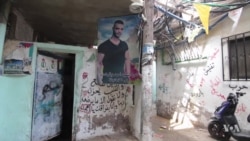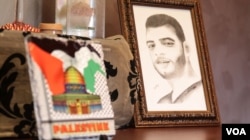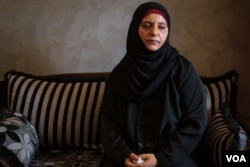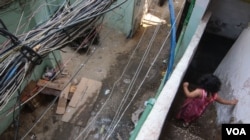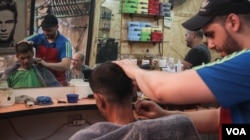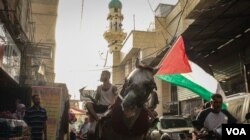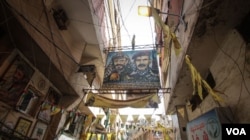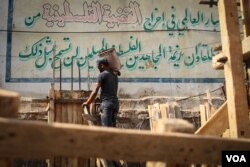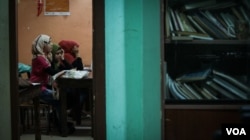Iman Muhammad Sheikha seems to cling to the memory of her son as she describes, in minute detail, the moments surrounding his electrocution.
She explains how Ahmad knocked into a high voltage cable just outside their home — one of thousands that form a deadly web over the streets of their home in Beirut’s densely packed Burj al-Barajneh Palestinian camp.
She details the power cut that afflicted the local hospital, trapping the barely-alive 20-year-old in an elevator for 15 minutes and preventing him from reaching much needed medical assistance. He died four days later.
“There is no reason [for how we are treated],” she said. “The Palestinians didn’t invade anyone here for us to be treated in this way - it’s like living in a prison.”
Blueprint for change
A furtive step towards greater rights for Palestinians in Lebanon like Iman Muhammad Sheikha has prompted both hope and cynicism among a community used to being forced to the fringes of society.
For the first time, all but one of the country’s numerous political parties gave the nod to a blueprint calling for a rethink over how to treat Palestinian refugees.
Meanwhile, the first ever census of Palestinians in Lebanon will - its proponents argue - offer the tools needed to begin these improvements.
While some welcome the developments, others are somewhat more skeptical.
Poor living conditions
Dozens have died in recent years from poor living conditions at refugee camps that many of the estimated 300,000-400,000 Palestinians and Palestinian Syrians in Lebanon live in.
Poverty rates have been estimated to be at 65 percent, and 90 percent for Palestinian refugees from Syria — yet sympathy and solidarity for Palestinians in Lebanon isn’t always easy to come by.
Forced into Lebanon during the creation of Israel in 1948, there were concerns that Palestinians would give up their dream of returning to their homeland if they were given the rights of full Lebanese citizens. Some Palestinian groups in Lebanon’s civil war also supported this policy.
As a result, while they may build in refugee camps like this one, Palestinians cannot own property in Lebanon. While some here may find ways to earn a living, laws exclude Palestinians from many professions.
The new plan for improving Palestinian rights, enhanced by the data collected by the census, has received support from nearly all the Lebanese political parties.
The blueprint calling for improved rights has brought together politicians normally divided on the issue, claims one of the plan’s architects.
“Palestinian issues in Lebanon have long been a matter of debate and difference between politicians,” said Abdel Nasser al-Ayi, project manager for the government-backed Lebanese Palestinian Dialogue Committee (LPDC), which was involved in the creation of the report and the census.
In addition to getting behind the plan, in February Lebanon's Speaker of Parliament Nabih Berri went to Tehran and expressed his support for Palestine, the right of return, and against the occupation.
Lebanese officials were also quick to express their solidarity with Palestinian Authority President Mahmoud Abbas when he visited Lebanon that same month; all were vocal in condemning the occupation, continued settlement building and Israeli aggression on Palestinian territory.
But public display of supports aside, some feel the leaders entirely ignore the legitimate grievances of Palestinians. Some say the top priority for the Lebanese government continues to be security in the Palestinian camps, leading some to question whether anything will really change for the refugees.
Some are skeptical
Mahmoud Hanafi, from the Palestinian Association for Human Rights, is among the skeptics.
He points out that the new plan was drawn up only by Lebanese politicians, though those behind it do claim to work closely with Palestinian groups.
“The committee’s main object is to help the government, not to support Palestinians,” he told VOA, claiming it effectively offers a fig leaf for the government against criticism that it was not helping Palestinians.
But the UNHCR broadly welcomed the blueprint, as did UNICEF’s Nazih Yacoub, himself a Palestinian.
He said it is a sign of significant progress and added that while imperfect, the LPDC offers an important “opportunity” that bring Palestinian issues closer to the center of power."
His organization is also working with the LPDC on the census, which is expected to release its results in the next two or three months and which Yacoub says will help “set up policies regarding the social and economic conditions” of Palestinians.
Some Palestinians are suspicious of a “hidden agenda” behind the census, Yacoub admits.
When the census-takers knocked on her door in Burj al- Barajneh, Sheikha did not suspect a conspiracy — she let them in and answered their questions.
But having lost her son to camp conditions that she says continue to deteriorate, she holds little hope that the blueprint will ever become anything more than that.
“Palestinians are fleeing these camps because life has become so unbearable,” she says.
“I have no faith in the political system here.”




